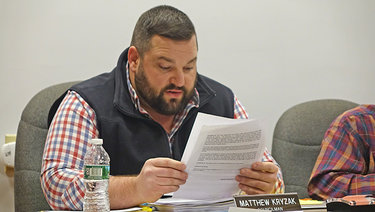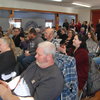Westerlo seeks to update laws, engage public
WESTERLO — The town of Westerlo is looking to modernize its body of local laws with the help of an outside agency that will deploy a legal team to make those laws easier to understand for both residents and town officials, part of a larger, years-long mission to increase transparency and get the public interested and engaged in government affairs.
The company, General Code, which proposed to the town that it would digitize and organize the town’s laws for just under $11,000, is already used by several municipalities in the area, including Guilderland, Berne, and the city of Albany; their laws are housed on the General Code’s code library, eCode360.
That digital repository is highly organized, filing laws under certain categories, which is in contrast to the way some municipalities store their own laws on their municipal websites, often as a page of links to laws organized chronologically.
For example, while Westerlo’s laws are currently displayed on the town site in the chronological format, Guilderland’s laws are organized according to type (e.g. Administrative Legislation and General Legislation), and then filed in order of chapter, making it easy to go in with an idea of what to look for and successfully find it.
Ultimately, taking this step will help Westerlo better enforce and follow the laws it’s taken the time to create and adopt. Supervisor Matthew Kryzak said that even he gets tripped up by the way Westerlo’s laws are currently organized.
“There’s certain laws that, as you’ve changed or adjusted them, you’ll supersede a law from 1970-something … and after you do that a few times, it’s easy to get lost in the language and not be able to figure out what supersedes what,” he said.
He explained that the town would hand over all its laws to the company, and those laws would then be reviewed by a team of lawyers that will, in addition to organizing, “say, you know, this local law is out of date and we need to do something about this.”
“The goal is to make it so anyone can read the town’s local laws,” Kryzak said, “and not walk away confused. At this point, even I get confused figuring out which law changed this and why and when.”
Progress and transparency
This attempt by Westerlo to ensure that its citizenry has access to laws and a reasonable opportunity to interpret them is in line with many of its major efforts over the past few years, beginning, arguably, when Bill Bichteman took over for longtime supervisor Dick Rapp.
Under Rapp’s nearly five decades of leadership, town budgets had become notoriously opaque, which Bichteman labored against after Rapp stepped down in 2019 and Bichteman was appointed acting supervisor, later to be elected. Budgets since Bichteman have been easy to read, and are presented to residents and discussed line-by-line at budget workshops each year.
Bichteman was well-suited for initiating a period of reform for Westerlo, given his intelligence and forceful presence on the board; although his stubborn and, as he once described it to The Enterprise, “goal-oriented” demeanor alienated some residents and town officials who felt that the changes he intended to make were pushed too strongly.
While Bichteman’s work on the town’s budget was widely praised, he had created controversy for himself when he advocated for the replacement of longtime town assessor Peter Hotaling, and, later, when he argued for downsizing the highway department’s workforce amid the most tumultuous months of the COVID-19 pandemic.
In addition to cleaning up the budget, Bichteman also oversaw the formulation of the town’s new comprehensive plan, and was involved in the town’s pursuit of several grants, including a seven-figure federal broadband grant.
Ultimately, Bichteman stepped down before the end of his first term as an elected supervisor, citing the political atmosphere — his harshest critics referred to him as a dictator, and former planning board chairwoman Dotty Verch, his opponent in the 2019 supervisor race, had once lodged an official harassment complaint against him, though nothing material came of it, and Verch declined to specify for The Enterprise what exactly he had done.
The supervisor role then fell to Kryzak, who had been named Bichteman’s deputy not long before Bichteman announced his resignation, and who was formally elected supervisor this past November.
Bichteman is a Democrat while Kryzak is a Republican.
Kryzak, like Bichteman, is determined to move the small, rural town forward, and to avoid the political pitfalls that have trapped towns like Berne, which has been a hotpot of partisan scandals over the same period of time that Westerlo has been ambitiously reforging its identity and seeking new financial opportunities.
Kryzak seems particularly focused on increasing the number of people who engage with the town and express their thoughts and concerns, an objective that’s targeted in the way the town board is selecting its appointee to fill the vacant board seat left when Kryzak replaced Bichteman, as well as an appointee to the zoning board, a process that’s still underway.
“To date, we’ve gotten seven applications for town board,” he said. “So we’re going through applications and we’re going to have an interview … for all the applicants. Everyone’s going to have a chance to interview, and we’ll pick the most qualified one.”
Meanwhile, only one application has been submitted for the zoning board position so, rather than hand that position over by default, the town board will incorporate questions about the zoning board into town board applications, creating “a nice talent pool of people that we can pull from when we have a vacancy,” Kryzak said.
Often, town appointments are made behind closed doors, and that can leave doubt among residents, occasionally, about whether an appointment was made based on qualification or if it’s a case of patronage. Opening up the process has generated interest where it wasn’t expected to be found, especially after the relative lack of interest in running for office that was seen in most of the Hilltowns, including Westerlo, during the last election cycle, which was practically defined by uncontested races.
The process also yielded a greater number of people than is typically seen at town board meetings of late, another area of concern which Kryzak’s board has been attempting to address, albeit less formally.
“We’re getting people who usually wouldn’t be involved in the whole town politics deal,” Kryzak said. “It’s kind of great. It’s fresh blood, new thoughts. All the stuff we need in town … I have a feeling that by engaging the public and trying to get more people involved, we’re going to get a whole lot more done.”



